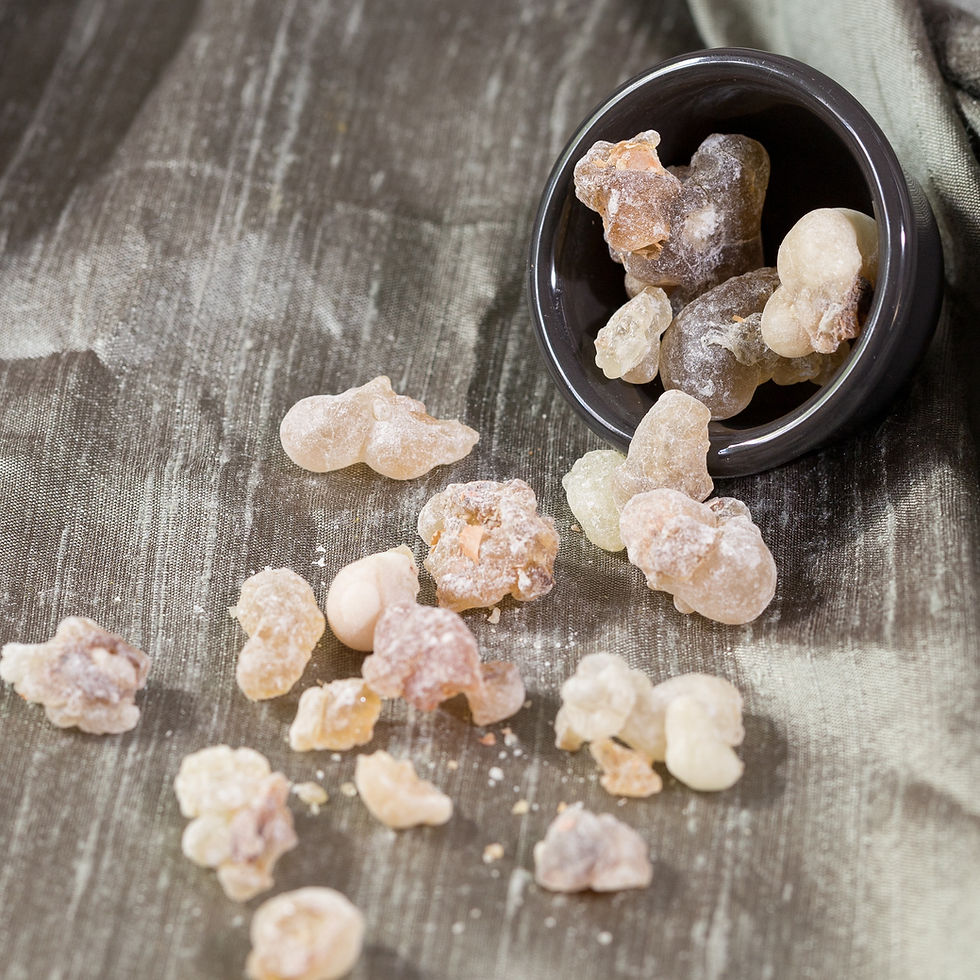Myrrh
- Kay Moorby

- Dec 20, 2023
- 3 min read
An Advent Journey through my least favourite Christmas carol (part 4).
If you would like to listen instead of read, then follow the link:

Even though it’s the title of this blog, I’ve had to check how to spell the word ‘myrrh’ every time I’ve written it. It’s just one of those words for me, like rhythm or diarrhoea (apologies if you were about to tuck into a mince pie)! I’m sure I’ll get a red squiggly line if I slip up…like the one that has genuinely just appeared under my first attempt to spell diarrhoea (I’ll get that corrected).
Luckily, I’ll never have to pop it into the Amazon search bar as I can’t see myself giving it as a Christmas gift any time soon…myrrh that is!
See what I did there? Seamless link…
Myrrh was the final gift brought by the wise men.
Myrrh is mine, its bitter perfume
Breathes a life of gathering gloom;
Sorrowing, sighing, bleeding, dying,
Sealed in a stone-cold tomb.
John Henry Hopkins, Jnr.
Happy birthday baby Jesus!
As gifts for small children go, this one is a little left field. I’m not saying that gold and frankincense were particularly sensible choices for a baby, but at the time of Jesus, myrrh had a strong association with sickness and death. I’ll leave you to imagine the modern-day equivalent, but I suspect it would only be available on prescription. Used as either a fragrant resin or ground into a medicinal powder, it is harvested in the same way as frankincense. Myrrh has amazing medicinal properties, but you need more than a spoonful of sugar to get this medicine down. I remember watching the chef Heston Blumenthal try and incorporate gold, frankincense and myrrh into a Christmas dinner (it’ll be on YouTube somewhere). In the end, he had the bark of the myrrh tree carved into a spoon as it was the only way he could incorporate it into the meal. The myrrh overpowered every flavour he tried to combine it with and was impossible to make palatable.
Myrrh was also traditionally used by the Egyptians in the embalming process and helped to stop the putrefaction of the deceased.
Nice!
For the Jews, myrrh became an integral part of funeral preparations and is mentioned at the death of Jesus.
38 After all this, Joseph of Arimathea, a disciple who kept his faith a secret for fear of the Jewish officials, made a request to Pilate for the body of Jesus. Pilate granted his request, and Joseph retrieved the body. 39 Nicodemus, who first came to Jesus under the cloak of darkness, brought over 100 pounds of myrrh and ointments for His burial. 40 Together, they took Jesus’ body and wrapped Him in linens soaked in essential oils and spices, according to Jewish burial customs.
(John 19: 38-39 VOICE)
With all this symbolism, it would have been perfectly understandable if Mary and Joseph had asked the wise men for a gift receipt to exchange their little pot of myrrh for something more appropriate.
Why would you give a sweet baby boy such a bitter gift?
Because…
He would suffer.
He would experience pain.
He would feel overwhelming sorrow.
He would reject the medicinal properties of the gift of myrrh as he hung on the cross and died for us.
Sadly, it was the perfect gift.
“Myrrh then is brought as a gift to acknowledge the human suffering that Jesus endured when he came into our world. As an embalming ointment, it signified that he was born to die for the world. The gift of myrrh symbolises suffering, trials tribulations and afflictions. The gift of myrrh reminds us of Jesus’ sacrifice, his very life for our salvation.”
Unknown Author
But myrrh also brings healing and relief from pain.
Used as a potent painkiller it would ease the suffering of those who were unwell. It brought healing and restoration to those who were sick, just as Jesus did throughout his life and ministry.
I know for some of you, this Christmas will be a bittersweet experience due to ill health.
I have friends navigating chronic illness and walking the long road of recovery after numerous hospital visits. Others wait for a diagnosis or treatment plan that will finally work.
Their gift of myrrh hasn’t quite arrived yet.
Many are trying to work out how they went from being at the centre of the Christmas festivities, heavily involved in church activities, to watching the celebrations from the sidelines.
They may be working out nap times, or rest days, to ensure they don’t miss out on family time or carols by candlelight with the rest of the congregation.
For those who could do with the healing properties of myrrh this Christmas, know that I and others are praying for you.
The next time you hear from me, Christmas will have passed, and we’ll be heading for the New Year.
Whatever you’re doing, however you’re feeling, I hope this Christmas is an opportunity for you to worship (the gift of gold)
reflect, (the gift of frankincense) and
be restored, (the gift of myrrh).
Kay Moorby








Kommentare